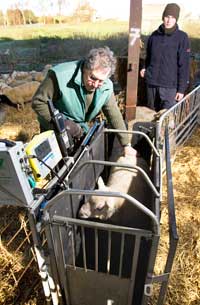EID ‘unreliable and difficult’ says damning report

Equipment used for tagging and electronically identifying sheep is unreliable and difficult to use, a report into the practicality of sheep EID has found. The two-year study, funded by the Welsh Assembly and Hybu Cig Cymru (Meat Promotion Wales), found some farms benefitted from easier recording of stock movements, lambing and medicine use. But costs were high, equipment could be unreliable, and farmers struggled to cope with unfamiliar technology. The study, which looked at the use of a range of different EID equipment on 14 farms and one abattoir, found problems with equipment supplies to farmers and compatibility issues between hand-held readers and tags. Hand-held readers were generally reliable and easy to use, while race readers worked well with integrated lamb crates. But using race readers to quickly read the tags of a group of sheep gave disappointing results, unless sheep stopped next to the reader. This persuaded some participating farmers that it was quicker to use a hand held reader on sheep in a race rather than a fitted static reader. Some farmers also found it very difficult to come to terms with the technology involved. “Understanding the computer and sheep management programs has been time consuming and has caused considerable farmer frustration, especially for those new to computers,” the report said. “The full benefit from this investment, in both money and time, will not be realised until farmers are familiar with the equipment and its capability.” The project also funded an EID reader at Randall Parker Foods abattoir at Llanidloes in Powys. Reading accuracy for different batches varied between 38% and 100% and averaged 84.5%. It appeared that other electrical equipment, including fluorescent light tubes and heavy duty motors, could interfere with the reading system. Members of the project steering group also interviewed auction market operators and found them ill-prepared for the introduction of sheep EID. All said that new investment would be necessary and the costs, which one auctioneer estimated could amount to 10p a lamb, would have to be passed on to producers. Ed Bailey, NFU Cymru vice-president, claimed the interim report confirmed the strength of the union’s arguments against compulsory sheep EID. The full report will be published in October and the interim findings are available at www.hccmpw.org.uk.
